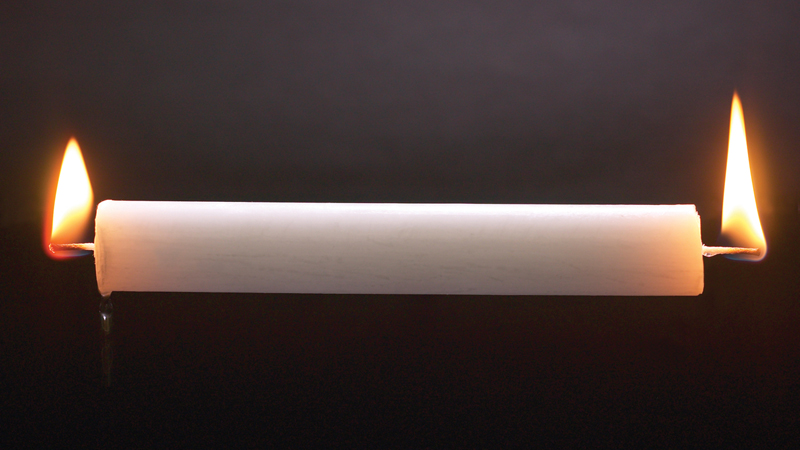In my hands I hold a unvarnished strand of wick. Untouched by wax, and unbeknownst to the feeling of
fire. The wax I’ve been preparing has melted, and is ready to completely cover and conceal the wicks
torso. I plunge the wick into the oozing wax, then finally pull it up for air. Each layer more oppressive than
the next. The torturous process continues till the wick is sufficiently weighed down by the burden of wax.
The wick is now forced to work in tandem with the wax, ultimately resulting in their partnership as a
candle.
fire. The wax I’ve been preparing has melted, and is ready to completely cover and conceal the wicks
torso. I plunge the wick into the oozing wax, then finally pull it up for air. Each layer more oppressive than
the next. The torturous process continues till the wick is sufficiently weighed down by the burden of wax.
The wick is now forced to work in tandem with the wax, ultimately resulting in their partnership as a
candle.
I place my new candle horizontally, hanging on the edge of the corner on my rectangular desk. Each end
sways in the air, waiting for stability. When it has finally balanced, I strike a match and light each end.
My candle burns with agony from head to toe, rather wick to wick. Both ends liquefy the wax in its way at
equal speeds.
sways in the air, waiting for stability. When it has finally balanced, I strike a match and light each end.
My candle burns with agony from head to toe, rather wick to wick. Both ends liquefy the wax in its way at
equal speeds.
After a few hours my candle grows numb to the pain. There is only an inch left of wax. The residue from
the defeated wick lies ashy on the ground. Stalagmites have formed, covering the corner of my
rectangular desk. There is only a centimeter left of wax. The flames of the fire erode the remaining wax,
till there is only a millimeter left. The final wax drips away before I’m able to say goodbye.
the defeated wick lies ashy on the ground. Stalagmites have formed, covering the corner of my
rectangular desk. There is only a centimeter left of wax. The flames of the fire erode the remaining wax,
till there is only a millimeter left. The final wax drips away before I’m able to say goodbye.
The untouched, pure wick I had once held in my hand is now riddled with carcinogens, and transformed
to ash. My candle, burning from both ends, is finally at peace. Although my precious wick is deceased,
the wax that once burdened it gets to remain.
As the soul of my candle ascends into the unknown, its body lays stiff on the corner of my rectangular to ash. My candle, burning from both ends, is finally at peace. Although my precious wick is deceased,
the wax that once burdened it gets to remain.
desk. Can its soul ever be redirected and its body left useless, or has its soul dissolved into nothingness
and its body left to be re-purposed?

Wow. This is a very unique way of adapting Woolf's tone and message. Also, I like how you included your own pondering at the end. Nice diction and description as well.
ReplyDelete